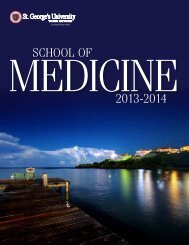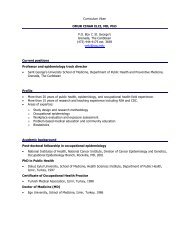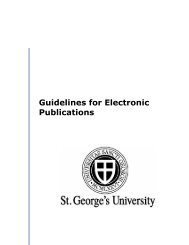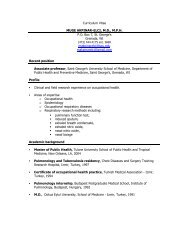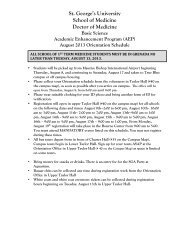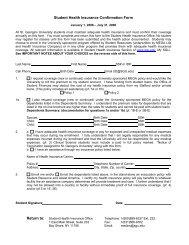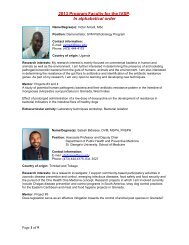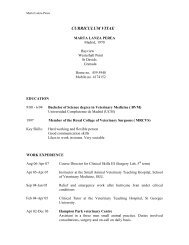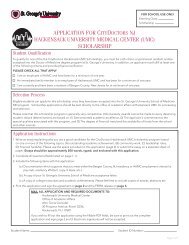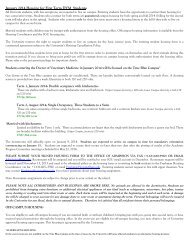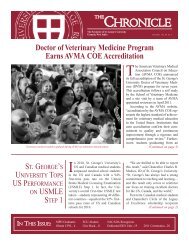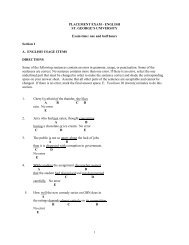SVM Catalogue 2012-2013 - St. George's University
SVM Catalogue 2012-2013 - St. George's University
SVM Catalogue 2012-2013 - St. George's University
Create successful ePaper yourself
Turn your PDF publications into a flip-book with our unique Google optimized e-Paper software.
of the professional practice of the core areas of public<br />
health. It provides an integrated overview of the field by<br />
surveying epidemiology, biostatistics, preventive medicine,<br />
environmental health, social and behavioral aspects of<br />
health, and health policy. The course will also give students<br />
an understanding of the tools needed to be effective<br />
leaders in carrying out the core public health functions of<br />
assessment, policy development, and assurance.<br />
PUBH 832<br />
Public Health Research Methods and Ethics<br />
As the second course required by the department, Public<br />
Health Research Methods and Ethics covers basic research<br />
tools needed to work successfully in public health and<br />
explores some of the common types of research encountered<br />
in public health settings. Topics include qualitative and<br />
quantitative data collection, design of research instruments,<br />
interpretation and dissemination of data, community<br />
assessments, and presentation of research findings. The<br />
course integrates case studies in public health ethics<br />
throughout the discussion of research so that the latter is<br />
considered in light of moral and ethical dilemmas that often<br />
occur. A combination of lecture, discussion, reading of<br />
literature, and computer applications are used to familiarize<br />
students with public research methods in public health.<br />
PUBH 853<br />
Public Health Surveillance<br />
This course provides a comprehensive overview of the key<br />
aspects of surveillance: history of public health surveillance,<br />
sources and collection of data, analysis and interpretation<br />
of surveillance data, communication of surveillance<br />
data, technology of public health surveillance systems,<br />
evaluation of public health surveillance activities, ethical<br />
and legal issues in surveillance, international and regional<br />
issues in surveillance, and future considerations. The course<br />
structure will be based on the principle that the purpose<br />
of surveillance is to enable evidence-based development<br />
of prevention and control programs, and to promote the<br />
most effective use of health resources. Surveillance is built<br />
upon dynamic and flexible principles of careful resource<br />
allocation, the best response to the current epidemic state,<br />
use of biological and behavioral data, and integration of<br />
various data sources.<br />
PUBH 855<br />
Community Medicine Seminar Series<br />
This course is a 16 contact-hour seminar series experience<br />
in which students are required to attend, participate in<br />
presented topics as well as develop and deliver a seminar<br />
on their own. This seminar series will contribute to the<br />
development of well-rounded (holistic) medical professionals,<br />
who will demonstrate knowledge and competence in<br />
dealing with primary health care, desire for lifelong learning,<br />
evidence-based practice, interdisciplinary team work, and<br />
professional and ethical behavior in practice in order to<br />
improve and sustain the health of the human population.<br />
PUBH 881<br />
Independent <strong>St</strong>udy<br />
This course is the opportunity for students to design a<br />
course of particular interest for self study in association<br />
with a faculty mentor. This course requires the permission<br />
of a faculty advisor.<br />
PUBH 889<br />
Practicum/Internship in Public Health<br />
This course is the third requirement of the department is the<br />
practicum. The practicum experience is a critical part of the<br />
Master of Public Health program, which integrates academic<br />
preparation with field-based experience. The internship<br />
allows students to apply academic coursework and training<br />
within a public health agency setting under the direction of<br />
a mentor or on-site supervisor. Internships are arranged on<br />
an individual basis with written goals spelled out in advance<br />
and approved by the student, faculty advisor, and on-site<br />
supervisor. <strong>St</strong>udents complete a minimum of 240 hours of<br />
fieldwork in the public health practice setting.<br />
PUBH 893<br />
Capstone Seminar<br />
The fourth departmental requirement is designed as<br />
a practical seminar to assist students to work through<br />
systematic steps in preparation of their Capstone Paper.<br />
The seminar covers topics in a planned sequence, such<br />
as selecting a topic, reviewing the literature, selecting<br />
data sources, selecting methods analysis, preparing a<br />
proposal, and writing stepwise drafts. The Capstone Paper<br />
demonstrates mastery of selected concepts of public health<br />
by integrating the core functions of public health within a<br />
comprehensive research paper. <strong>St</strong>udents determine the<br />
topic of the paper and work according to the schedule of<br />
the Capstone Seminar to show understanding and mastery<br />
School of Medicine<br />
Course Descriptions<br />
School of Veterinary Medicine Catalog <strong>2013</strong>–2014 | 59



